The one thing I quickly learned when we started keeping honey bees, is just how different raw honey tastes when compared to grocery store honey. It's like night and day, and for good reason.
Plus, there are so many health benefits of honey as well as eating raw honeycomb when it is eaten raw!
Did you know, a lot of the honey you buy from a grocery store, is pasteurized and is likely sugar water?
You see, as beekeepers, you can feed your bees sugar water (which is necessary from time to time to help them out). The worker bees will produce honey from this sugar water because it is the job of the bee to produce honey to keep the hive alive by any means.
Each bee has a job in the hive through their entire development as a honey bee.
But feeding your bees sugar water is really an economical way to mass produce honey for companies who are not based in rural settings with access to flowers and blossoms. Think about that.

How Beekeepers Feed Bees
As farmers, we feed our bees sugar water in the late summer as they build up their own reserves to survive the winter, because after we harvest the real honey from them, we want them to be able to make more for themselves.
We do this at that time as most natural flowers have stopped blooming and the bees really need this boost to pump up their honey reserves. This time of year is called a "derth" which basically means, inadequate supply (in this case, of flowers and blossoms). So we need to supplement them so they can make it to spring when they can forage naturally again.
So yes, supplementing bees with sugar water during times where there is no nectar in flowers is necessary, but, we don't want to collect that honey that they make.
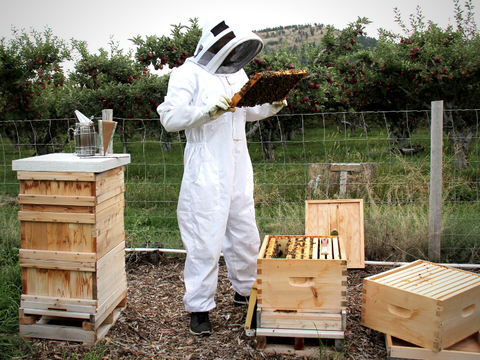
*My husband inspecting our backyard hives
Bees will eat this honey they make from the supplement through the winter and hopefully make it to the next spring when they can come out of their hive again and start to forage on all of the flowers that begin to bloom.
The process of feeding bees sugar water is a practice that can be abused when money is on the line from honey sales and you need to mass produce honey quickly.
Of course, there are companies who purchase real honey from farmers, but this is going to be pasteurized honey which will remove all of the bee pollen and other antioxidant properties and healthy benefits of raw, natural honey.
But what is the difference between store bought honey and raw honey? Great question.
The Difference Between Store-Bought Honey and Raw Honey
If you are purchasing this store bought honey or pasteurized honey that comes from sugar-fed bees, you are most likely missing out on all of those amazing health benefits that come from raw honey and from bees who forage flowers for nectar. You are missing out on the true benefits of real honey.
You see, raw honey contains bee pollen, bee propolis and other natural components that is becoming more and more world-recognized as a super food. (This is one of the reasons why we keep bees on our property, to get the real stuff!)
But, it is only raw honey that is the super food.
This store-bought sugar honey is simply that - sugar. So you think you are benefitting your body and consuming some amazing health benefits when you replace your white sugar with honey, but you are just consuming a different form of sugar, unless it comes from a beekeeper.
Is Be Pollen Good For You?
Yes, bee pollen is very good for you, and bee pollen is also something that is not found in grocery store honey!
According to the national Library of Medicine, bee pollen "contains bioactive compounds including proteins, amino acids, lipids, carbohydrates, minerals, vitamins, and polyphenols. The vital components of bee pollen enhance different bodily functions and offer protection against many diseases. It is generally marketed as a functional food with affordable and inexpensive prices with promising future industrial potentials."
How To Tell If Honey Is Real?
Unfortunately, there is no way to tell if honey is real honey or if it made by bees who forage through flowers and blossoms, or even if it is produced by feeding the bees sugar water. Once honey is pasteurized and bottled for the store, it all chemically looks the same.
The best way to know, is to know where your honey is coming from.
Find farmers who sell their own honey. Know where you food is coming from. This is so important, to know that you are getting the real deal and the associated health benefits of raw honey!
What Is Organic Honey?
Something interesting, according to Brian Thompson, owner of Honey Lake Bee Company, is to be aware when purchasing pure bee products, such as honey and beeswax from a seller claiming it is "organic", as it likely comes from imported sources.
Brian says:
I know it sounds crazy, but USA laws do not allow us to claim our beeswax as "organic". USDA regulations state that because honey bees travel 2-3 miles from their hive, EVERYTHING within their range has to be organic - impossible in the USA. However, wax coming from foreign sources can make the claim (no verification needed) and be labeled as "organic".
This is something we, and most beekeepers, already know.
What beekeepers will tell you, is that their product is natural, and they can also tell you where it is foraged from.
For example, knowing where I live, my honey is foraged from orchard blossoms and dandelions (among other wild flowers and my own garden blossoms). I live nestled between apple, cherry, peach and apricot orchards.
But they can't tell you that it is organic.
If someone says their honey is organic, know that in today's society, it is virtually impossible to control that.
They would have to own so much land, and also control any pesticides that travel in the air and land on their flowers. Beware of the organic honey claim when it comes to bee products from any stores, health food stores or farm stands. And any times you see "organic" on a label of honey in the stores, there are different regulations from companies that are overseas, and that honey is likely imported and not organic.
Does Raw Honey Taste Different Than Store-Bought Honey?
Comparing raw, local honey from a beekeeper to store-bought honey is like comparing snow to rain. Essentially, it is the same thing. Both honeys will look the same and flows the same, however, they are totally different. The flavors you get from real honey is extraordinarily different, and amazing.
We are not a large producer of honey at our house, and don't sell it online... (yet).
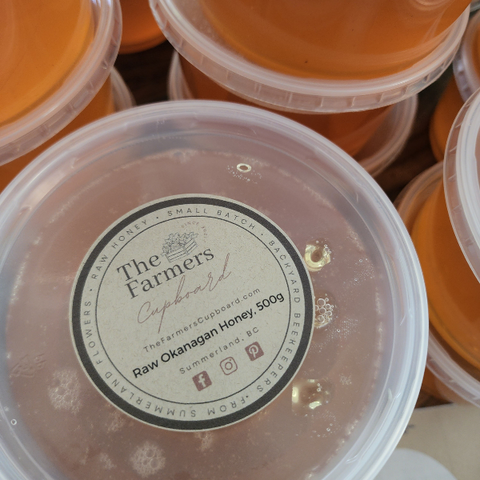
We have anywhere from 6-10 hives on a given year to make enough raw honey for our family and extended family members we give it away to, and to sell at our local farmers market.
I can tell you this though, being surrounded by orchards, I can taste where my bees have collected nectar from. One year it may be very apricot heavy tasting.
Last year, I found our raw honey quite peachy and figure that my bees must have really focused on the peach orchard. It is so interesting to taste raw honey and pick up those notes!
This is why I always recommend finding local honey or honey from a small producer so you can experience the difference yourself.
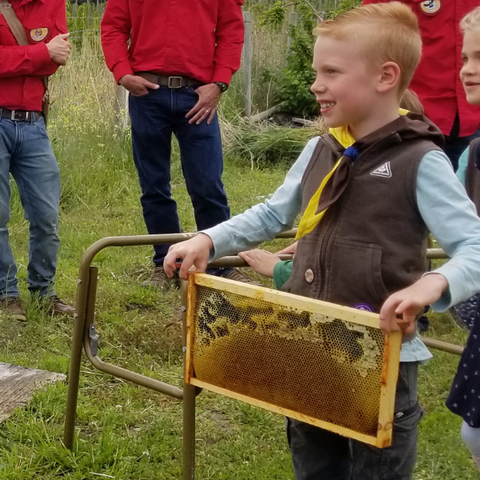
*Photo from Scouts Canada visiting our backyard bee hives
Tasting the different flavors that are in natural honey is a life changing experience that will have you questions what is happening to our food industry with the foods they are selling us at grocery stores.
Shop for raw honey on Etsy here
What Are The Benefits of Raw Honey?
Wondering about the health benefits of unprocessed honey? There are so many sweet honey benefits! Let's go through them.

1. Raw Honey is Packed with Antioxidants for Immune Support
Raw honey is a nutritional powerhouse, loaded with antioxidants that play a huge role in supporting a healthy immune system.
It is believe that regular consumption of raw honey can lead to enhanced overall health benefits and resilience against illnesses and allergies. The antioxidant component is a major factor in honey's health benefits.
2. Raw Honey Has a Natural Energy Boost with Carbohydrates and Sugars
Raw honey is an excellent source of energy in terms of health benefits to consider. Unlike refined sugars, the carbohydrates in raw honey are easily digestible, providing a quick and sustained energy boost.
Whether you're an athlete gearing up for a workout or someone seeking an afternoon pick-me-up, a spoonful of raw honey consumption can be a natural and effective solution.
According to Science Direct, there are implications that honey has some major health benefits on the body:
"Honey is a natural energy-rich, low glycemic index food with a variety of biological activities. It is reported to correct muscle pathology in diseased conditions. Because skeletal muscle is the key structure involved in the exercise, we explored the literature for the exercise-promoting potential of natural honey. Bee honey improves physical performance at moderate levels of activity, and it reduces the production of inflammatory cytokines and biomarkers of fatigue following strenuous exercise among athletes. Supplementing ischemic heart disease patients with honey combined with floral pollen improved patients’ tolerance for physical loads and corrected metabolic dysfunctions. Therefore, the therapeutic use of honey may have implications for increasing the capacity for exercise in aged and diseased individuals."

Raw Honey's Impact on Skin Health
3. Raw Honey Helps Skin with Antimicrobial Properties
Raw honey's antimicrobial and antibacterial properties make it a valuable addition to skincare routines. It has been said that applying pure honey or raw honey to the skin can help fight acne, reduce inflammation (through its anti inflammatory effects), and promote a healthy complexion.
Its natural enzymes can also contribute to gentle exfoliation, leaving the skin looking radiant and refreshed.
According to a research paper on bee products in dermatology and skin care on MDPI written by 3 medical and pharmaceutical scientists:
"Honey, propolis and pollen are used to heal burn wounds, and they possess numerous functional properties such as: antibacterial, anti-inflammatory, antioxidant, disinfectant, antifungal and antiviral. Beeswax is used for production of cosmetics and ointments in pharmacy. Due to a large number of biological activities, bee products could be considered as important ingredients in medicines and cosmetics applied to skin."

*photo of our backyard honey bees, the Queen bee is marked with a yellow dot if you can find her!
Learn more about Queen Bees here
A Sweet Remedy for Respiratory Health
4. Raw Honey Soothes Coughs
Raw honey has been a go-to helper in our own household for health benefits such as soothing coughs and sore throats. Its natural anti-inflammatory properties can calm irritated throats, and incorporated into a warm drink just feels so good.
As soon as any of us in our family are feeling sick, we mix raw honey with some lemon juice and ginger root with boiling water and drink it like tea. I can't recommend this one enough.

Nature's Detoxifier: Raw Honey and Digestive Wellness
5. Raw Honey Supports a Healthy Gut Microbiota
Raw honey acts as a prebiotic, promoting the growth and activity of beneficial bacteria in the gut. A balanced gut microbiota is crucial for digestive health, nutrient absorption, and overall well-being.
Including raw honey in your diet can contribute to a flourishing gut environment - so add it to your tea, coffee, smoothies, as marinades and into your homemade salad dressings.
According to the International Journal of Scientific and Research Publications - Volume 2, Issue 4, April 2012 Edition, honey is a good source of prebiotics:
"Traditional dietary sources of prebiotics include soybeans, inulin sources (such as Jerusalem artichoke, jicama, and chicory root), raw oats, unrefined wheat, unrefined barley, honey, almonds and yacon. Prebiotics improve the number and/or activity of probiotic bacteria (Conway et al. 2001, Gibson et al. 2004, Salminen et al. 2004 & Macfarlane et al. 2008). Hence the aim of this study was to investigate various adhesion attributes; aggregation abilities, cell surface hydrophobicity property and autolytic activity of L. acidophilus NCDC 13 and L. acidophilus NCDC 291 to comparatively evaluate prebiotics honey and inulin.
Where To Buy Raw Honey
If you are wondering where you can buy raw honey online from trusted beekeepers, we are working on a list to share with you, but it will take some time and research to make sure it the real deal. Bookmark this page to come back and check, we will be sure to update when our research is completed.
Learn more about how beekeeping works
Finding raw honey will be tough to do. We first would recommend finding local sellers or handmade selling platforms if you want to look for yourself.
If you are looking at online grocery stores or places like Amazon for raw honey, you will have a very hard time finding it, or finding real raw honey. Oftentimes, honey sold there may include high fructose corn syrup.
Here is a place we would start looking, and be sure to bookmark this page as once our research is finished, we will share where to buy raw honey.
See raw honey options on Etsy here
What is the difference between buckwheat and manuka honey?
Buckwheat and Manuka honey are distinct varieties of honey, each originating from different sources and each having their own unique characteristics.
Buckwheat honey comes from the nectar of buckwheat flowers. It is recognized for its intense flavor, featuring molasses and malty undertones, and it looks like that too! It is dark in color, ranging from deep amber to nearly black.
In contrast, Manuka honey comes from the Manuka tree found in New Zealand and Australia, and it has an earthy, herbal flavor with a slightly bitter aftertaste.
The color of Manuka honey varies from light amber to dark brown, influenced by factors like floral sources and processing methods.
Apart from their flavor distinctions when eating honey, these honeys also differ in their nutritional compositions.
Buckwheat honey contains various vitamins, minerals, and antioxidants, contributing to its reputation for having a higher antioxidant content compared to some other honey types.
On the other hand, Manuka honey is renowned for its unique antibacterial properties attributed to the presence of methylglyoxal (MGO). Beyond MGO, Manuka honey also has antioxidants, amino acids, and other beneficial compounds.
Is One Type of Honey Better Than Another?
There are many kinds of honey out there besides buckwheat and manuka. There is clover honey, acacia honey, wildflower honey, crystallized honey.... etc.
As long as you are purchasing a raw honey (and to make sure of this, you know where your honey is coming from by purchasing directly from a farmer or beekeeper) then you will get all of those amazing health benefits that come with all those amazing components of raw honey, like bee pollen and bee propolis.
Summary: A Sweet Symphony of Health Benefits
In conclusion, raw honey goes beyond its role as a healthier sweetener, offering a so many different health benefits through its' natural inclusions like bee pollen and bee propolis.
From boosting the immune system after eating honey, to promoting radiant skin and supporting digestive wellness, raw honey proves its worth as a versatile and holistic remedy.
Including raw honey into your lifestyle not only adds sweetness but also enhances your overall well-being, with so many honey benefits.

*here is one of our own drone bees we found who has sadly damaged his wings. Drone's have no stingers so they can't sting you.
Frequently Asked Questions About Raw Honey
Q1: Is raw honey better than processed honey for health benefits?
A1: Yes, raw honey is generally considered superior to processed, pasteurized honey. Raw honey retains more of its natural nutrients and beneficial compounds as it is not subjected to heat or filtration during processing.
Q2: Can raw honey help with weight management?
A2: While honey is a natural sweetener, it should be consumed in moderation. It is a sugar. However, the natural sugars in raw honey can be a better alternative to refined sugars for health benefits, and some studies suggest that it may have a positive impact on weight management when used mindfully.
Q3: Are there any risks associated with consuming raw honey?
A3: Raw honey is safe for most adults, but it should be avoided in infants under one year due to the risk of botulism.
Q4: How can I incorporate raw honey into my daily routine?
A4: Raw honey can be drizzled over yogurt, added to tea, used as a natural sweetener in recipes, or enjoyed on its own. It's a versatile ingredient that can enhance the flavor of dishes. I personally use it daily in my espresso or coffee - highly recommend this, it tastes amazing!
Q5: What is the best replacement for white sugar?
A5: Honey is the best replacement for white sugar. It is full of antioxidant properties and also promotes anti inflammatory effects if it is raw honey you are eating.
Here are some other articles you may be interested in reading:
The BEST Ways To Use Beeswax At Home
Did you like this article?
❤️ Here's how you can support our blog:
My name is Linnea and I am a backyard gardening enthusiast! Along with my husband and our two kids (and chickens, ducks, bees and our little dog). Our hobby - growing our own food and making our meals from scratch. My blog, The Farmers Cupboard, is the website that blossomed from that passion. I love every second I spend sharing our hobby with like minded backyard growers.
It's easy to support my blog, and it is so appreciated. Please SHARE an article somewhere, pin a photo to your Pinterest board, follow on any of our social medias or sign up for our newsletter! That's it!
These little things help our blog grow and allow us to continue doing what we love: growing good food and sharing what we learn.
PINTEREST PASSIONATE? We're opening up our cupboard to you!
Click on the pin below made just for you. It will bring you right to my little Pinterest community, where I would love for you to FOLLOW The Farmers Cupboard and see all of our gardening and backyard dream ideas!
Let's grow good things together!

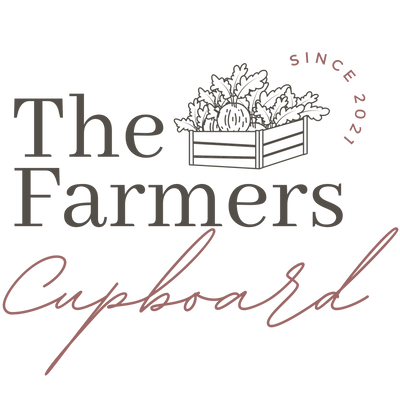

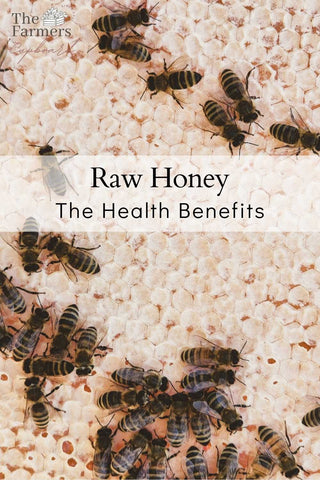
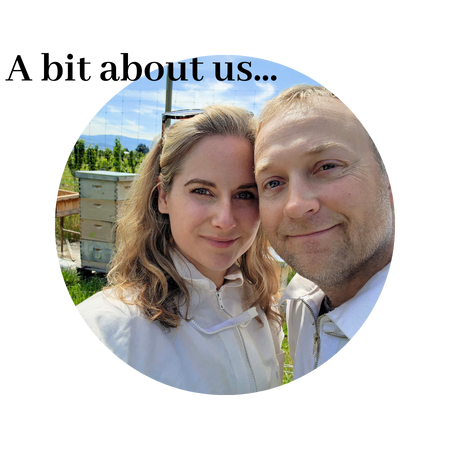







Hi Dale,
I haven’t put such a list together yet, I like to really deep dive when I do these recommendations. Will add it to my list ;) However, in saying this, I do have a list of beekeepers who sell their raw beeswax- many of them also sell raw honey. So if you want to purchase raw honey, I would suggest starting with my list on that article: https://www.thefarmerscupboard.com/blogs/bees-honey/where-buy-beeswax Thanks!
Thanks for sharing a useful and informative blog on the health benefits of raw honey. You mentioned the nutrients and health benefits of raw honey. It is a learning topic and I learned a lot about raw honey. I use honey and get health benefits. I like your blog and also prefer organic products.
Where can I get a list of honest Raw Honey producers?
Hi Hugh, wow what an amazing story! Thank you so much for sharing that and your sweet experience with honey. Would love to know if you are a beekeeper now after that experience??
Hi… what an informative read. I came across honey as a young apprentice carpenter way back in 1968.
I was the first child in a family of 7 children. Having left school which was run by Catholic nuns word got back to them that Hugh had started his working life as a trainee carpenter. Sister Superior soon tracked me down. Her request was for me to build them a beehive.
With a bit of research I managed to source the beehive drawings from the local library.
Having enjoyed the challenge I soon presented the convent with a brand new beehive.
My reward was not money. I was introduced to world of Honey.
To this day honey has formed part of my daily diet. Tea, porridge and toast all with a dash of honey. What a start to the day.
Thanks for sharing this amazing blog on Benefits of Raw honey. I love it